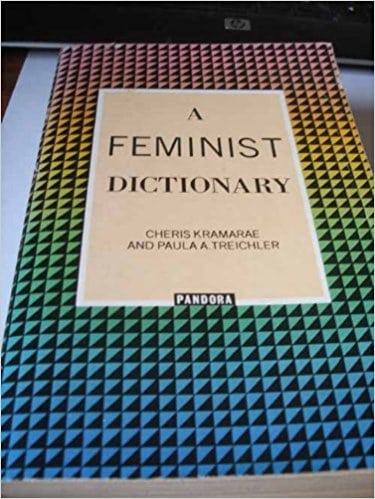Review of A Feminist Dictionary, by Cheris Kramarae and Paula A. Treichler
Where to begin? With the unpleasant little entry for lexicographer? With the nasty piece on dictionary? with the inaccurate definition of grammar? the somewhat silly entry at language? It is hard to tell. It is, in fact, hard to tell if this is really a dictionary in the usual sense of the word: much of it is a book of quotations (mostly) from the writings of militant feminists. It is universally condemnatory and bitterly sarcastic, a relentless diatribe against men, males, the masculine gender and, particularly, all who are seen to purvey language as the medium of oppression. As an expression (= `outpouring’) of propaganada, it is well done; as a dictionary and what we usually mean by that term, it is Biercian–but totally devoid of humor or, indeed, any compensatory qualities to mitigate its viciousness. Were I a woman, perhaps I might not feel so angry with it, but I should probably be made angry by it. As a man, I am irritated by its provocations, which would annoy any man by blaming all men for the injustices women have undoubtedly suffered throughout the ages. Language undergoes semantic change under myriad influences, many of which are poorly understood. If such change can be accelerated by propaganda, I have no objection to that. I object to the notion that change can be legislated.
There are some aspects of this book that are good, some that are bad and, possibly, self-defeating. The worst in the latter category is the continual confusion between lesbianism and feminism–at least insofar as I understand their concepts and practices. Lesbianism has to do with women being sexually involved with other women; I don’t really much care what people do with each other sexually–whether they are men or women–as long as they don’t interfere with the sexual pursuits or inclinations of others. Feminism, as I understand it, is something entirely different, being a matter of moral and civil right; that many who espouse feminism are also lesbians may be unfortunate for The Cause and has given it a somewhat warped perspective and aspect. There are, of course, other aspects to feminism–psychological, linguistic, sociological, etc.–and A Feminist Dictionary treats them all. What is objectionable about it, and what sets it apart from what most people expect from a dictionary or other reference work is its proselytizing, strident tone: the reader gets the feeling that the book is screaming at him.
As for the pronoun of reference (him) in the preceding sentence, it is the epicene one; on the other hand, there may be few women (and no feminists) who would react with the same measure of revulsion as a man to the tone of the book.
Looking at the book from an entirely different point of view–that is, not as a dictionary but as a collection of statements on the many topics it covers–it must be said to be an extremely useful documentation of the views of feminists on those topics, which range from A, abbess, and Abominable Snowmen of Androcratic Academia through an incredible variety of entries that few people are likely to know enough about to look up, to zugassent “Term used by George Noyes Miller (1845-1904) for the male continence program practiced at Oneida, New York, a utopian community in which members regularly analyzed sex roles and discussed their utopian visions of sex and class equality.” Set into a framework provided by the editors/authors, the “definitions” consist almost entirely of quotations, for which a full bibliography is provided (pp. 515-87).
While it is conceivable that someone might look up entries like pronoun (and other language terms), Ms, dike, and some others, it seems less likely that a user might expect to think of or encounter PMZ (“Post menopausal zest.”), quilting, or Grandmother Turtle. Thus, the book may be regarded as a series of short and long items that are to be read as such: it is only a bit peculiar to encounter such matter in alphabetical order. As documentation, A Feminist Dictionary records an enormous amount of information in a relatively small compass. Occasionally, that information is a bit distorted, though it is not easy to tell to what purpose. For example, the entry on Random House Dictionary reads as follows: Edited by Jess Stein (1967), was financed inhouse by a publishing corporation interested in profit. Though dictionary-making in the U.S. has always been competitive and motivated by economics as well as scholarship, the Random House Dictionary embodies some of the consequences of purely commercial lexicography. (James Sledd 1972)
It is not clear what these comments have to do with feminism or even lexicography. There may be some complimentary and some unkind things to be said about the RHD and its treatment of issues that arouse feminists to militant rage, but they are scarcely worthy of repetition out of the context of the subject at hand. In defense of the RHD it must be acknowledged that, whatever its shortcomings, it has a better reputation and has better withstood the test of time than its critics. There are few other seemingly gratuitous entries in the book, but they are in the minority. All in all, viewed as a social document, A Feminist Dictionary is an outstanding piece of work that collects into one convenient volume the cogent, intelligent comments of feminists alongside the irresponsible ravings of the lunatic fringe, all of which must (apparently) be regarded as representative of feminism. As a dictionary, per se, it is a disaster, but only a minor one.
Laurence Urdang
(Vol. XXIII/2)
Submit your review | |

